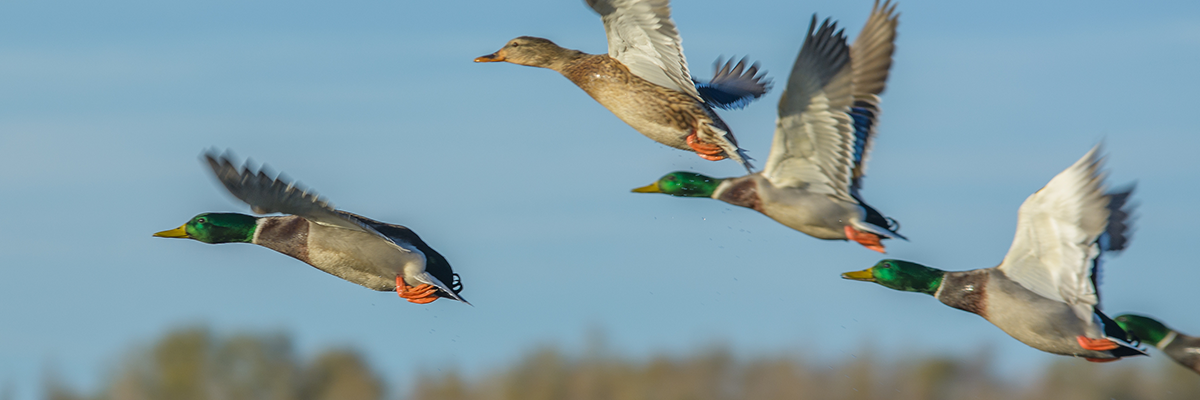Highly Pathogenic Avian Influenza (HPAI) is a contagious type A influenza virus that affects domestic and wild birds. It is important to note that wild birds may be infected with HPAI and remain asymptomatic or they may also experience symptoms or death.
HPAI is highly transmissible and poses a threat to domestic poultry, wild bird health and potentially human health (however, according to the CDC, to date, no human infections have been recorded in North America).
Avian influenza viruses can infect all avian species, although infections are particularly common among waterfowl (etc. ducks, geese, swans) and shorebirds (etc. gulls).
Observable Symptoms (will vary between species, signs unrelated to known physical trauma):
- Sneezing
- Open Sores
- Discharge from the mouth, nose, ears or vent
- Behavioral abnormalities: falling over, head tilt, head and neck twisting, circling, paralysis, seizures
- Locomotion abnormalities: unable to stand or flap wings properly, yet with no traumatic injuries
- Mass mortality or clusters of wild bird mortality
**RESCUERS PLEASE READ**
Spring 2022 is upon us! If you see wildlife in distress please do the following:
- Safety First! If the environment is unsafe for you or if you are not familiar with the species and their natural defenses, do not proceed with attempting a rescue.
- Gloves should be worn when handling all wildlife. If you are interested in being a wildlife rescuer for PWRC, contact 204-510-1855 and you can pick up a box of disposable gloves that can be used for rescues. Alternatively, rubber gloves that can be disinfected with bleach can also be used. For birds with piercing beaks or claws wear heavy gloves (ie. leather) and launder immediately after.
- Wildlife should be contained in a cardboard box that can stay with the animal, if this is unavailable the transport container must be disinfected with bleach after use.
- Pembina Veterinary Hospital/Winnipeg Emergency Veterinary Hospital (at 400 Pembina Hwy) will continue to be a 24 hour drop off location for injured/orphaned wildlife.
- For additional information or assistance please call Prairie Wildlife Rehabilitation Centre at 204-510-1855 or Manitoba Environment, Climate & Parks at 204-945-5221 and after hours at 1-800-782-0076 to speak to a conservation officer.
Note: Unfortunately this year, due to the potential risks of HPAI, individuals who own domestic pet birds or come in contact with poultry should not participate in wildlife rescues**
Websites for more information:
Government of Canada website on wild birds and HPAI:
https://www.canada.ca/en/environment-climate-change/services/migratory-game-bird-hunting/highly-pathogenic-avian-influenza.html#toc3
HPAI Update for Wild Birds in your Region: http://www.cwhc-rcsf.ca/avian_influenza_biweekly_reports.php
You can receive automatic updates via email by sending a request to info@cwhc-rcsf.ca.
HPAI Updates for Domestic Poultry in your Region: https://inspection.canada.ca/animal-health/terrestrial-animals/diseases/reportable/avian-influenza/eng/1323990856863/1323991018946
Canadian Wildlife Health Cooperative (CWHC) – Reporting Website and Regional Contacts: http://www.cwhc-rcsf.ca/report_and_submit.php
Public Health Agency of Canada (PHAC) – Avian influenza Information and Contact Information: https://www.canada.ca/en/health-canada/services/healthy-living/your-health/diseases/avian-influenza-bird-flu.html#how
Public Health Agency of Canada (PHAC) – Wild birds and avian influenza – Handling guidelines: https://www.canada.ca/en/public-health/services/flu-influenza/fact-sheet-guidance-on-precautions-handling-wild-birds.html
Food and Agriculture Organization of the United Nations (FAO) – Wild bird highly pathogenic avian influenza surveillance: https://www.fao.org/3/a0960e/a0960e.pdf

